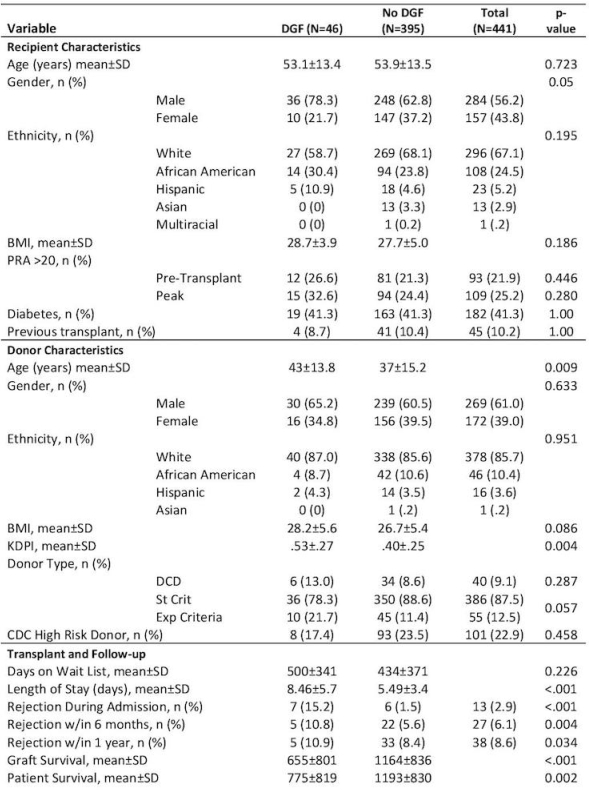Delayed Graft Function in Patients Receiving Alemtuzumab Induction Therapy
1The University of Toledo Medical Center, Toledo, OH
2The Alliance for Paired Donation, Maumee, OH.
Meeting: 2015 American Transplant Congress
Abstract number: A163
Keywords: Graft failure, Induction therapy, Kidney transplantation, Rejection
Session Information
Session Name: Poster Session A: Kidney Immunosuppression: Induction Therapy
Session Type: Poster Session
Date: Saturday, May 2, 2015
Session Time: 5:30pm-7:30pm
 Presentation Time: 5:30pm-7:30pm
Presentation Time: 5:30pm-7:30pm
Location: Exhibit Hall E
Alemtuzumab (Campath 1-H) is a humanized monoclonal antibody directed at the CD52 glycoprotein that is becoming more prevalent as a choice for induction. Delayed graft function (DGF), or the need for dialysis within the 1st 7 days of transplantation, is an important complication that has been described in up to 50% of transplants. The purpose of this study was to determine the association between DGF and rejection, graft life, and patient survival.
All transplants from January 2006 to July of 2014 who received alemtuzumab induction were included, while those receiving other agents were excluded. Recipient and donor demographics and recipient outcomes were obtained through review of electronic medical record and the computerized UNOS database, and summarized in figure 1. Statistical analysis was then performed utilizing IBM SPSS Statistics version 19.0 (IBM Corp., Armonk, NY). Statistical significance was calculated using student t-test and chi square, where appropriate.
During the study period, 441 deceased donor renal transplants were performed with Alemtuzumab induction. Of these, 46 (10.4%) experienced DGF requiring dialysis within the first 7 days of transplant. DGF was more likely in males (p=.05), recipients receiving transplants from older donors (p=.009), and donors with higher KDPI (p=.004). A total of 7 (15.2%) patients with DGF experienced acute rejection during admission vs 6 (1.5%) without DGF (p<.001). Rejection was also more likely at 6 months (p=.004) and 1 year (p=.034) in patients with DGF. The mean graft survival for patients with DGF was 655 days vs 1164 days in patients without DGF (p<.001). The mean patient survival in patients with and without DGF was 775 and 1193 days, respectively (p=.002).

Based on our data, DGF was more likely in males, older donors, and higher KDPI donors. Patients with DGF were significantly more likely to experience rejection at all time points measured, shorter graft life, and earlier mortality. Further data analysis will be needed to determine the correlation between DGF and rejection as a cause of graft loss.
To cite this abstract in AMA style:
Shindorf M, Fumo D, Weis M, Qu W, Rees M, Ortiz J. Delayed Graft Function in Patients Receiving Alemtuzumab Induction Therapy [abstract]. Am J Transplant. 2015; 15 (suppl 3). https://atcmeetingabstracts.com/abstract/delayed-graft-function-in-patients-receiving-alemtuzumab-induction-therapy/. Accessed February 14, 2026.« Back to 2015 American Transplant Congress
